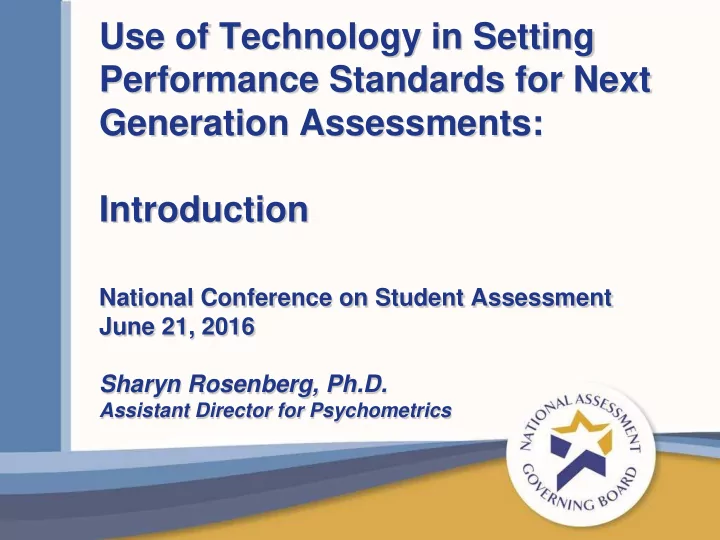

Use of Technology in Setting Performance Standards for Next Generation Assessments: Introduction National Conference on Student Assessment June 21, 2016 Sharyn Rosenberg, Ph.D. Assistant Director for Psychometrics
Testing on Computers Computer-based assessment is not new Computer-based testing is becoming much more prevalent across multiple contexts Nature of computer-based assessment is changing
Standard Setting on Computers Computer-based standard setting is not new Computer-based standard setting is becoming much more prevalent To represent content of computer-based assessments To enhance standard setting procedures New item types present unique challenges
Overview of Session 1. Standard Setting for the National Assessment of Educational Progress (NAEP) Technology and Engineering Literacy (TEL) Sharyn Rosenberg , National Assessment Governing Board Steve Fitzpatrick , Pearson
Overview of Session 2. Standard Setting for the Partnership for Assessment of Readiness for College and Careers (PARCC) assessments in English language arts and Mathematics Laurie Davis , Pearson Eric Moyer , Pearson Jeff Hauger , New Jersey Department of Education
Governing Board Experience with Computer-based Standard Setting
Judgmental Standard Setting (JSS) Studies on 2009 NAEP Grade 12 Reading and Mathematics Paper-based assessment administration Standard setting process computerized using Computer-Aided Bookmarking (CAB) Software developed under contract to WestEd (with subcontract to Measured Progress) Time intensive Computerization allowed for greater efficiency of data analysis/production of feedback
Setting Achievement Levels on 2011 NAEP Writing Grades 8 & 12 Computer-based assessment administration Prompts had some interactive features (e.g., video) but PDFs of student responses generally adequate Standard setting process computerized using BoWTIE Software developed by Measured Progress Time intensive Computerization facilitated use of pinpointing
Governing Board Considerations for NAEP TEL Standard Setting First experience setting achievement levels on assessment consisting largely of scenario-based tasks Shorter than usual timeline (not feasible to develop complex new software) Previous Bookmark software developed for 2009 JSS was effectively obsolete by 2014
Recommend
More recommend